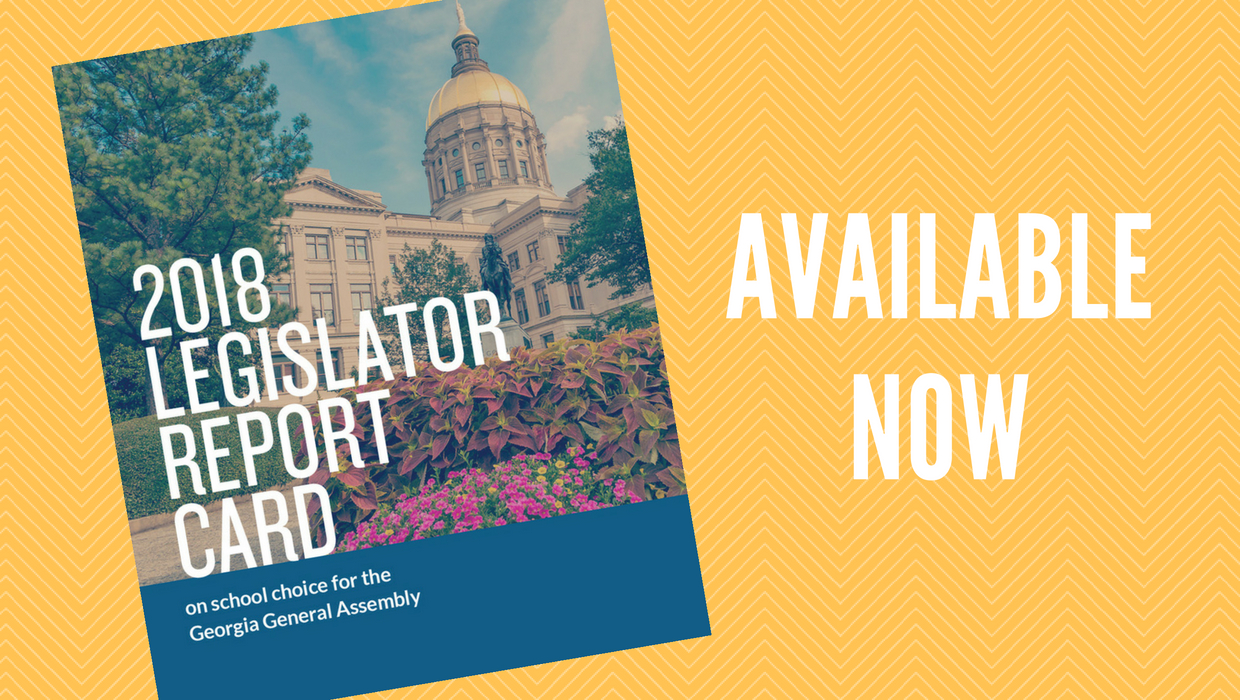
by Georgia Center for Opportunity | Oct 15, 2018
The mandate from Georgia voters is clear—by an overwhelming margin, they want lawmakers in the General Assembly to pass legislation expanding school choice in 2019. That’s the finding of a new poll released by the Georgia Center for Opportunity (GCO).
The survey found that nearly seven-in-ten (67 percent) voters say it’s important for the state legislature to enact policies that expand school choice in the next legislative session, and that support extends across party, racial, and geographic lines. Of all school choice measures available in Georgia, the Tax Credit Scholarship Program garnered the most support.
Underscoring the bipartisan nature of school choice, the survey found strong support for school choice regardless of political affiliation—75 percent of Republicans, 65 percent of Independents, and 62 percent of Democrats. Support is strong across racial and geographic lines as well: 70 percent of African-American voters and 66 percent of white voters support school choice, while voters in Augusta (76 percent), Atlanta (68 percent), and Savannah (65 percent) are also supportive.
These new survey results come on the heels of the General Assembly’s move this year to expand the Tax Credit Scholarship Program to serve tens of thousands of additional students in need of options. In 2019, lawmakers could take up legislation to make Georgia the seventh state to enact Education Savings Accounts, an innovative way for parents to pay for the education their children need.
With the 2019 session of the General Assembly a few months away, elected officials would be wise to pay attention to the voices of more than two-thirds of Georgia’s likely voters—and voice their support for school choice, too!

by Georgia Center for Opportunity | Oct 12, 2018
Peachtree Corners—A new poll released by the Georgia Center for Opportunity (GCO) has found that a significant majority of likely Georgia voters—to the tune of 68 percent—support school choice for families across the state.
Ahead of the 2019 legislative session, nearly seven-in-ten (67 percent) voters say it’s important for the state legislature to enact policies that expand school choice in the next legislative session, and that support extends across party, racial, and geographic lines. Of all school choice measures available in Georgia, the Tax Credit Scholarship Program garnered the most support.
Underscoring the bipartisan nature of school choice, the survey found strong support for school choice regardless of political affiliation—75 percent of Republicans, 65 percent of Independents, and 62 percent of Democrats. Support is strong across racial and geographic lines as well: 70 percent of African-American voters and 66 percent of white voters support school choice, while voters in Augusta (76 percent), Atlanta (68 percent), and Savannah (65 percent) are also supportive.
“School choice has long been, and continues to be, a winning issue,” said Randy Hicks, GCO’s president and CEO. “No matter who’s leading under the Gold Dome in 2019, Georgians recognize its importance for creating a better tomorrow for every child, but particularly those from disadvantaged backgrounds who need help the most.”
The survey was conducted by WPA Intelligence. Interviews were collected from September 19-23 among over 600 likely voters in Georgia. The margin of error was plus or minus 4 percent.
Get more details about the poll here: GCO Poll Memo

by Georgia Center for Opportunity | Aug 29, 2018
When it comes to expanding educational choice for all students and families in Georgia, our state has a lot to celebrate this year.
During the last legislative session, lawmakers took some crucial strides to help kids trapped in failing schools or stuck in classrooms that don’t meet their needs, particularly by expanding the Tax Credit Scholarship Program. Even so, so many of our state’s most at-risk children still lack access to real educational options. They’ll have to wait yet another year to get the quality education they need to achieve their dreams and become productive members of society.
Here at Georgia Center for Opportunity, our goal is to keep you fully up-to-date on which school choice bills passed—and which didn’t—during the most recent legislative session. We’re also committed to sharing how your elected representatives voted on each of these bills.
That’s why we’re so excited to release our 2018 Georgia Legislator Scorecard on School Choice. This report card tracks how every legislator voted on school choice bills before the state assembly—and assigns a letter grade just like our students receive in school. We also offer a recap of how each bill fared in each legislative chamber—with failed or stalled bills noted, indicating our focus for the upcoming 2019 session.
Many legislators say they support school choice during the campaign season, but the true test of whether they walk their talk is revealed in how they vote on bills that empower parents with the options and resources they need to secure the best education for their children.
We hope you find this scorecard useful, and we hope you share it with your family and friends! Download the Report Card HERE.

by Georgia Center for Opportunity | Aug 29, 2018
33 state lawmakers recognized for outstanding support of school choice in 2018
PEACHTREE CORNERS – On Wednesday, the Georgia Center for Opportunity (GCO) released their 2018 Legislator Report Card, a scorecard recognizing state lawmakers according to their voting record on key school choice bills. The report empowers parents to see where their Representative and Senator stood on bills that would expand access to quality education for kids throughout the state.
Randy Hicks, President and CEO of the Georgia Center for Opportunity, said the scorecard is necessary because too many children are waiting for their chance at a better education.
“Time and again, Georgians on all sides of the aisle continue to express their support for expanding parental choice,” Hicks said. “We praise the legislators who prioritized children and families in 2018, and look forward to seeing greater movement under the Gold Dome to ensure all students have access to the best possible education.”
Legislation considered in the scorecard include an expansion to the state’s tax credit scholarship program and increases to funding of state charter schools. Both bills passed in 2018.
The scorecard ranks legislators on an A-F grade scale, though special honors were given to those who demonstrated outstanding support for educational choice. Members were named a “School Choice Champion” if they received As following both the 2017 and 2018 sessions, while those on the “Honor Roll” were recognized for sponsoring or co-sponsoring a bill that would increase educational options.
In total, 33 current and outgoing legislators in the House and Senate received “Honor Roll” and/or “School Choice Champion” honors. Some are listed twice as they were given both designations. They include:
School Choice Champion:
Senator John Albers (R- Alpharetta)
Senator Burt Jones (R- Jackson)
Senator William Ligon Jr. (R- Brunswick)
Senator Josh McKoon (R- Columbus)
Senator Fran Millar (R- Dunwoody)
Senator Michael Williams (R- Cumming)
Representative Buzz Brockway (R- Lawrenceville)
Representative Wes Cantrell (R- Woodstock)
Representative John Carson (R- Marietta)
Representative David Casas (R- Lilburn)
Representative David Clark (R- Buford)
Representative Heath Clark (R- Warner Robins)
Representative Earl Ehrhart (R- Powder Springs)
Representative Barry Fleming (R- Harlem)
Representative Mike Glanton (D- Jonesboro)
Representative Rich Golick (R- Smyrna)
Representative Scott Hilton (R- Peachtree Corners)
Representative Jan Jones (R- Milton)
Representative Todd Jones (R- South Forsyth)
Representative David Knight (R- Griffin)
Representative Randy Nix (R- LaGrange)
Representative Ed Setzler (R- Acworth)
Representative Valencia Stovall (D- Forsyth Park)
Representative Sam Teasley (R- Marietta)
Representative Scot Turner (R- Holly Springs)
Honor Roll:
Senator Brandon Beach (R- Alpharetta)
Senator Matt Brass (R- Newnan)
Senator Chuck Hufstetler (R- Rome)
Senator Fran Millar (R- Dunwoody)
Senator Ben Watson (R- Savannah)
Representative Kasey Carpenter (R- Dalton)
Representative John Carson (R- Marietta)
Representative David Casas (R- Lilburn)
Representative Heath Clark (R- Warner Robins)
Representative Robert Dickey (R- Musella)
Representative Earl Ehrhart (R- Powder Springs)
Representative Mike Glanton (D- Jonesboro)
Representative Rich Golick (R- Smyrna)
Representative Scott Hilton (R- Peachtree Corners)
Representative Rick Jasperse (R- Jasper)
Representative Jan Jones (R- Milton)
Representative Todd Jones (R- South Forsyth)
Representative Randy Nix (R- LaGrange)
Representative Jay Powell (R- Camilla)
Representative Alan Powell (R- Hartwell)
Representative Ed Setzler (R- Acworth)
Representative Valencia Stovall (D- Forest Park)
Representative Sam Teasley (R- Marietta)
Representative Scot Turner (R- Holly Springs)
The 2018 Legislator Score Card on School Choice can be downloaded online at foropportunity.org/education/school-choice.
###
Georgia Center for Opportunity (GCO) is independent, non-partisan, and solutions-focused. Our team is dedicated to creating opportunities for a quality education, fulfilling work, and a healthy family life for all Georgians. To achieve our mission, we research ways to help remove barriers to opportunity in each of these pathways, promote our solutions to policymakers and the public, and help effective and innovative social enterprises deliver results in their communities.

by Georgia Center for Opportunity | Jul 3, 2018
What goal is more important than ensuring our most vulnerable students have the best shot at success? That’s what Georgia’s Special Needs Scholarship Program is all about. Now in its 11th year, the scholarship enables children who have special needs to transfer to another school to better meet their unique educational needs.
Over 4,500 students benefited from the program during the 2016-2017 school year, with scholarships averaging $5,722 per student.
But despite the success of the program, there is a lot more to be done. A House study committee convened in mid-June to consider updates to the program, specifically revisions contained in House Bill 801. HB 801 would make two significant updates to the Special Needs Scholarship Program—first, by giving parents more flexibility in how to best use scholarship funds on behalf of their child, and second by opening up scholarship funds to home-educated students.
In the first case, the bill would allow parents to use scholarship dollars for ongoing therapies, tutoring, or specialized equipment. This, in turn, would empower children with special needs to excel in the classroom and beyond.
Sometimes, students with special needs are lagging behind in their traditional public school environments. So, when they transition to a private school through the scholarship, they have to play catch up to get fully up-to-speed. Allowing parents to use scholarship funds for approved non-tuition expenses would go a long way toward helping these students stay on track at their new schools.
This type of change makes sense: Public schools are already required to provide in-house speech, occupational, and physical therapy for children with special needs. Granting scholarship recipients the same flexibility is wise.
At the study committee hearing on HB 801, parents made emotional appeals, asking lawmakers to open scholarship funds to homeschool families as well:
A former Gwinnett teacher now homeschooling her adopted children said they would benefit if the scholarship was opened to homeschoolers for tutoring and therapies, including speech, physical, occupational and equine. Her seven children face multiple struggles related to the chaos of their early lives and, in some cases, fetal alcohol syndrome and visual impairments, that render a traditional classroom unworkable, she explained.
An Atlanta mother said she pulled her bright daughter with autism out of a public middle school because the girl grew anxious and overwhelmed in such a big setting. Her daughter’s therapist recommended homeschooling to alleviate the anxiety. The mother’s goal is to homeschool now and then enroll her daughter in a small, flexible high school. She asked lawmakers to drop the requirement that students only qualify for the voucher after a full year in public school.
The Special Needs Scholarship Program is working for Georgia families who need help the most. But that doesn’t mean there isn’t room for improvement. By making these two changes, lawmakers would open up the scholarship program to hundreds of additional families in need of real educational options.



